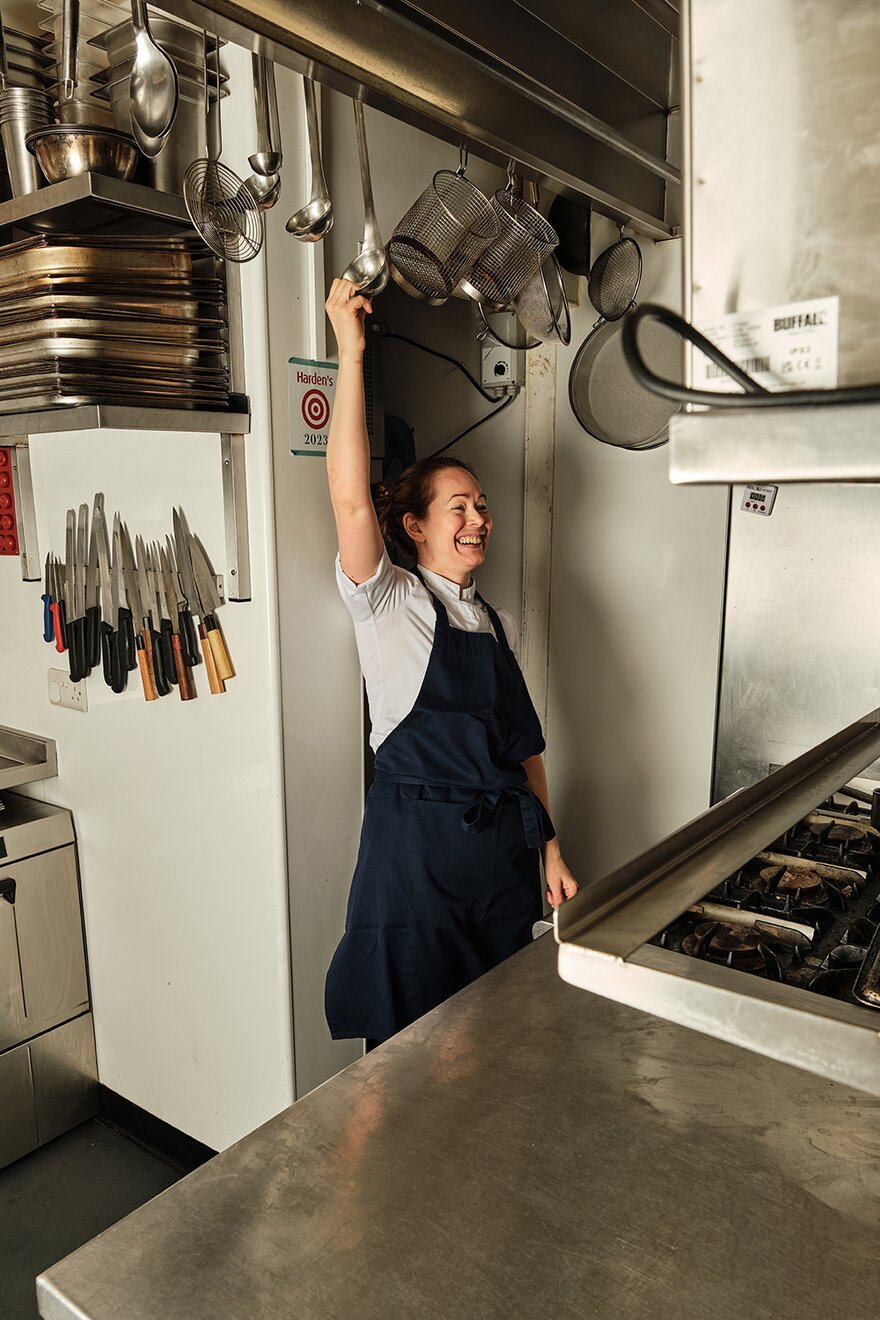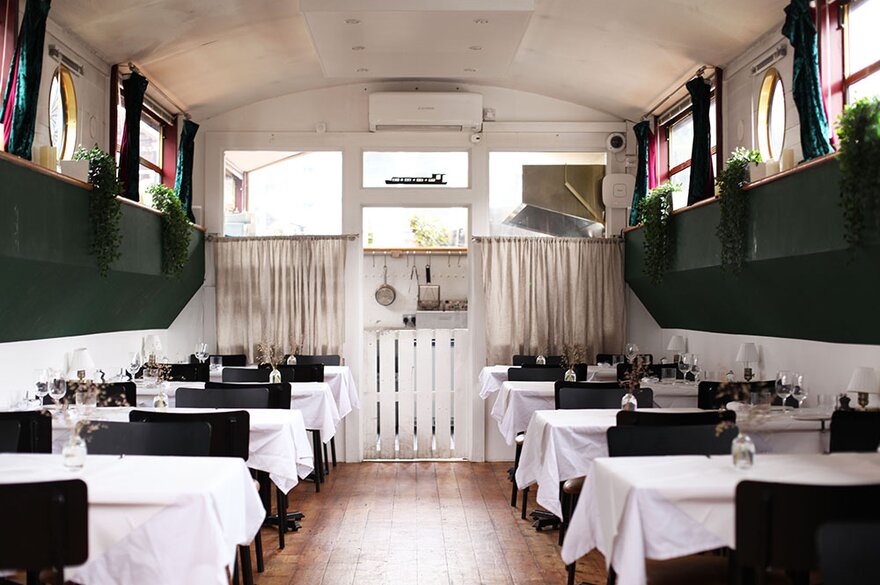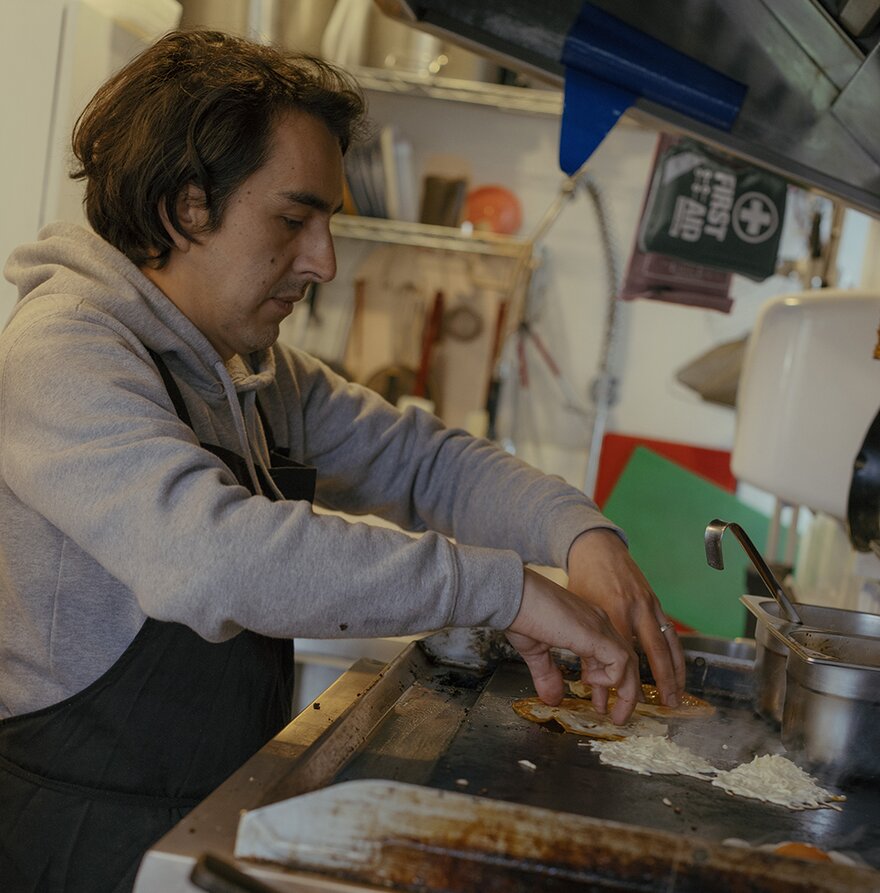Meet the chefs serving some of the UK's best dishes in the tiniest of spaces.
Think miniscule kitchens and your mind probably doesn't wander to restaurants turning out Michelin-quality plates or cutting-edge street food, but many of Britain's most inventive chefs are working from surprisingly small spaces.
The confines of historical buildings or barges means having to adapt kitchens within existing spaces, while property found in city centres is at such a premium that square footage is an expensive commodity not to be wasted on big prep spaces.
While it might seem like a handicap, having a small space – as the chefs below explain – can be a catalyst for creativity, forming close bonds and perfecting consistency.
James Goodyear at Evelyn's Table
James Goodyear is head chef at Evelyn's Table, a Michelin-starred chefs' counter for 12 guests in a basement on the fringes of London's Chinatown
It's a big ask to take on a Michelin-starred kitchen and maintain its momentum, but having been mentored by Raymond Blanc, worked at three-Michelin-starred Maaemo in Norway and as head chef at Michelin-starred Adam's in Birmingham, James Goodyear was more than qualified when he took over in January 2023.
In fact, his time at Maaemo came in handy beyond the cookery – the restaurant's petite open kitchen taught Goodyear to navigate the confines of a tight space.
Like most things in life, it seems to all boil down to good prep. "We have to consider the dishes carefully, because we're performing in front of guests," he says. "We can't finish 10 different things at once like we would do in a normal service kitchen. We do 80% of the work beforehand, and then we carefully think about what we do in front of the guests to finish things off. It's like going into a theatre performance every night. When that curtain is up at 6pm, we're open. There's no scrambling around – we are ready."
He's not blind with love for the space either – of course he'd like more room, but equally he notes that "having restrictions increases originality and inventiveness". And being so close to his compatriots maintains the quality levels of the food too, Goodyear thinks.
"In a large kitchen, sometimes things can get diluted, but when you're in such close proximity, everyone can see how it's being done. So I think in terms of breeding and nurturing talent, a small kitchen is fantastic."
Roberta Hall-McCarron at Eleanore
Roberta Hall-McCarron is executive chef of Eleanore in Leith, a small neighbourhood restaurant serving a set menu by head chef Hamish McNeill
At roughly three by three metres, the kitchen at Roberta Hall-McCarron's second restaurant, Eleanore, isn't exactly generous, but it's a space she knows intimately, as it was the original location of her first concept, the Little Chartroom. The latter was so successful it muscled its way up and out into a larger property within a few years, an evolution that left Hall-McCarron to re-establish how she used what was left behind.
"You don't know what you need until you've worked in the space, but every single inch is used to its maximum," she says. It seems to defy physics, but inside she's managed to squeeze in ovens, fridges, shelves, barbecues, prep space and sinks. There's even a water bath under a section of the bar outside that guests then unknowingly eat above while meat slow-cooks underneath. But it's not always high-tech kit that has the largest impact – a simple row of hooks for utensils hanging above the stove were "life-changing", while stackable food containers run floor to ceiling on simple shelves.
The traditional storage spaces of the kitchen have been turned out into the dining room, and now ferments, pickles and preserves line the walls where guests sit, with a coat cupboard turned into a dry store for ingredients.
While Hall-McCarron oversees Eleanore, her 6'8" head chef Hamish McNeill leads the team on the ground. "Everyone says, did you try to find the biggest chef for the smallest kitchen? But Hamish is very nimble,"
Hall-McCarron laughs. Aside from McNeil, there can be up to three other chefs working in the space, which means there's no room for a kitchen porter. Instead, it's "all hands on deck" to clear the washing up.
The food also has to be practically considered when working with such neat proportions. One way the team at Eleanore do that is by balancing the menu between hot and cold dishes, so there's never a bottleneck at the stove. Hall-McCarron says: "We also do a set menu now. It allows us to control the ordering. We have less waste and I think the food is better because there's so much more structure to the menu."
While physically there may be limitations – for instance, the kitchen can't process whole beasts – Hall-McCarron thinks the positives outweigh the negatives: "There are so many plus points to a tiny kitchen. Everything is within reach, and if you can't spread yourself out you can't do thousands of jobs at one time. You do need to learn how to work really neatly. Sometimes I miss this small kitchen.
"I think in many ways, maybe I didn't push myself enough when the kitchen was the Little Chartroom, because I used to think we couldn't do things because we didn't have the space. It's been really interesting watching what the guys there have managed to achieve now it's Eleanore."
Tommy Banks at the Black Swan at Oldstead
Tommy Banks owns the Michelin-starred Black Swan at Oldstead in York with his family. The kitchen is a 1970s annex to the original pub
At first glance Tommy Banks' Michelin-starred kitchen might not seem miniscule, but when you factor in a team of 10 producing up to 540 precise plates in any one night, things start to feel a little cramped.
Banks estimates that his pub is around 430 years old, meaning there are few alterations he could make to the building. With a 1970s purpose-built kitchen annex in situ, he was left to work with what he had.
"It was built for making chicken in a basket," he quips, "not a 14-course tasting menu". Instead of structural work, he mapped out the kitchen with one large central communal bench and a rotational workflow. All cooking is done around the edges, with the middle reserved for prep and plating. "It means lots of people can dress food on the central bench which effectively becomes a pass," he says.
One of Banks' favourite pieces of kit is his Adande fridge drawers, which he uses as both fridges and freezers. They create definable sections – like pastry or larder areas – and when pulled out can also be used as prep surfaces that are accessible from both sides, introducing more workable counters.
His tip for chefs working in small spaces is to focus on your strengths. "Don't try to be somebody else or something that you can't achieve in your small kitchen. If you're good at making a specific thing, just make that. At the end of the day the guest doesn't care how big your kitchen is, but they do care about the offering and how long they're waiting for their food."
Lorcan Spiteri at Caravel
Lorcan Spiteri is head chef at Caravel in north London, a restaurant on a barge which he runs with his brother
Post-lockdown a run of barges that were used as offices on Regent's Canal were left vacant, a chance byproduct of the pandemic that left Spiteri with the opportunity to transform one into a restaurant. Barge secured, there was the slight issue of getting plumbing and electricity aboard, but the next hurdle was furnishing the kitchen to serve 40 on a budget.
"We opened with a tiny oven – the size of a microwave – that got cold as soon as you opened it, a couple of induction hobs, a fryer and a plancha," he says. Once they proved the formula, they upgraded slightly, and there's a prep kitchen offsite too, but day-to-dayeverything's done from just a few square metres at the end of the boat.
Spiteri's most-loved item is his wheelie shelves that he can pile "full of stuff that can stay ambient", because fridge real-estate is precious. If they need more of anything during service it's delivered from the prep kitchen through an overhead hatch, but mostly he says the confines work because their food "isn't fancy. We don't do foams and gels, we just do classic cooking with good flavours."
Despite not being a traditional chef's counter, the open-ended element means there's still interaction with guests, which benefits both customers (who get a bit of a show) and the team, who are able to hear first-hand how people have enjoyed their food.
"People come and say thank you, and that's super-nice to hear. If it comes straight from the customer it gives you a boost when you've had a tough service. Everyone likes a little compliment."
Max Fishman at Bad Manners
Max Fishman owns Bad Manners, a Mexican café he runs with chef Rodrigo Cervantes from a converted info-booth in Hackney Churchyard
Max Fishman from Bad Manners – a hole in the wall, unconventional Mexican restaurant – isn't a chef, so he's looking at his confined space from a whole other angle. With a background in management consulting, his route into hospitality was a lockdown passion project let loose and his main concern was would there be enough passing trade? And would the kitchen work to fulfil enough orders? Erring on the side of caution, he laid roots in a small building in Hackney Churchyard which he says is the perfect size.
In fact, they expanded briefly by introducing an outdoor grill last summer, but communication was then cut off between the indoor and outdoor teams, resulting in "carnage" that Fishman says he's unlikely to want to repeat.
Instead of immediately redesigning the space, the present kitchen has been a slow evolution. "I'm always surprised. I think we have very little space, then we buy another piece of kit and we have to find somewhere for it to go," he says. He's managed to squeeze in tiny versions of things, like a mini dehydrator and a petite purpose-built ferments cupboard.
The menu is overseen by Rodrigo Cervantes, who used to work for a number of sites under restaurant group Super8, including the tiny Thai restaurant Kiln, which inevitably gave him a penchant for pinched spaces.
Fishman says the key to success is knowing their limits: "We've had to design our menu around our equipment, so almost everything is cooked on the plancha which has incidentally helped us to secure our success as a go-to for less traditional Mexican food."
Roberta Hall-McCarron's favourite kitchen kit
"We have Konro grills built into the wall with custom-made shelving above that allows us to cook different things at a different temperature at the same time. We can rest or temper things up higher, get things smoky in between or cook directly on top of the barbecue. The shelves are there permanently and the barbecue just slots underneath."
Space-saving tips
"Build shelves up the walls as high as you can, and add a foldaway ladder that allows you to reach everything." – Roberta Hall*
"Be tight with your orders so you never have too much food to prep and keep at any one time." – James Goodyear
"Invest in multi-purpose kit like fridge drawers which can be used for refrigeration as well as prep surfaces when pulled out." – Tommy Banks
"Work out what you need as you go, and upgrade slowly so you get it right rather than rushing things." – Lorcan Spiteri
"Don't be afraid to try new things. There's usually a clever way to fit something in if you want it badly enough." – Max Fishman
Continue reading
You need to be a premium member to view this. Subscribe from just 99p per week.
Already subscribed? Log In












